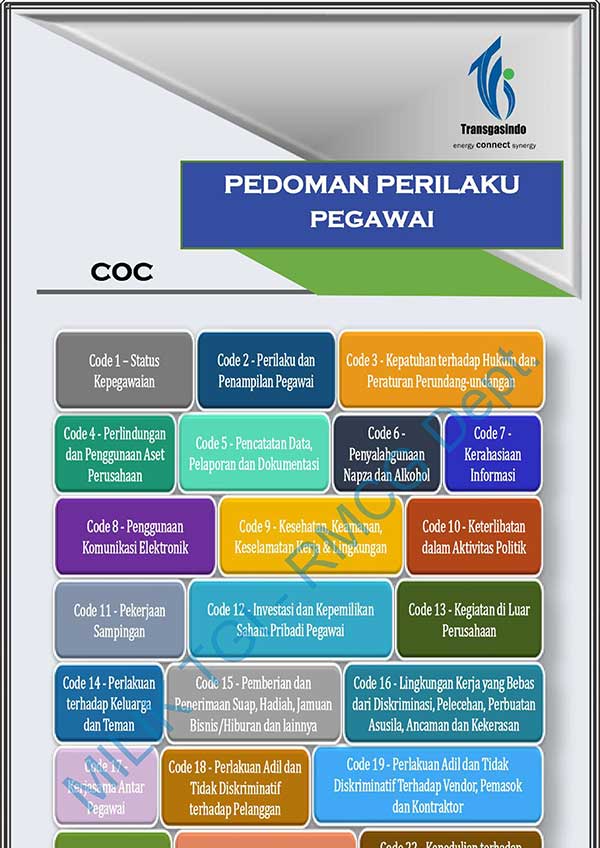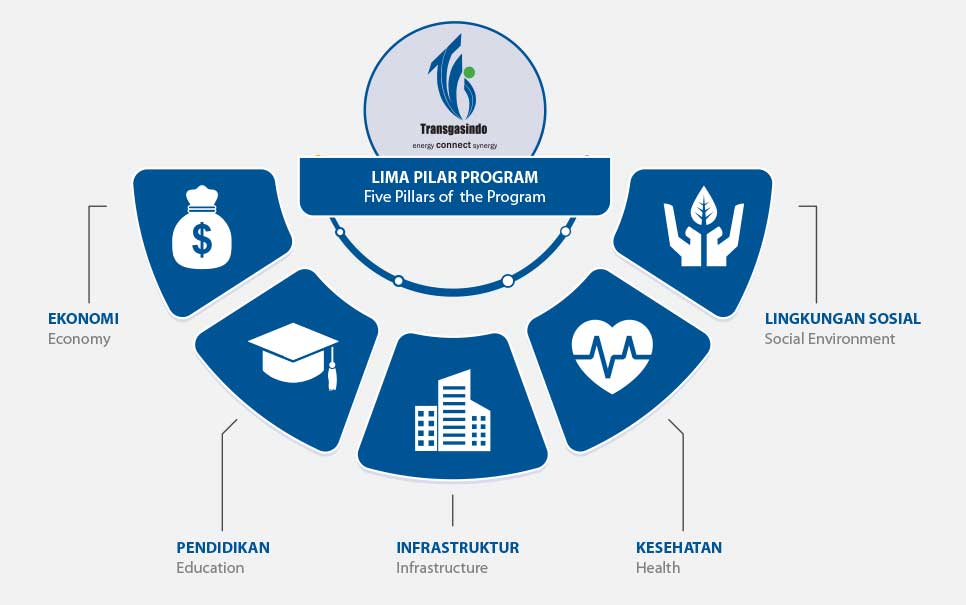Corporate Activities


Overview
Other aspects of increasing corporate values include the implementation of all daily business activities in line with the principles of Good Corporate Governance and Business Ethics. Further, we implement a comprehensive Health, Safety and Environment management system, synergizing every resource, developing local community relations and strengthening communications with and concern for our valued employees.
Good Corporate Governance (GCG)
PRINCIPLES OF GOOD CORPORATE GOVERNANCE
The Company is highly committed to continuing to instill GCG principles, which are Transparency, Accountability, Responsibility, Independence and Fairness in all business aspects, to become a consistent and sustainable application in order to achieve more optimal business success and maintain business resilience.

| Principle | Description | Application |
|---|---|---|
| Transparency | Disclosure of Company information and material facts in a timely, clear, accurate and accessible manner to shareholders. | Disclosure of information by the Company is carried out in a clear and timely manner, and can be accessed easily by all stakeholders as stipulated in the applicable laws. |
| Accountability | Determine the function, structure, system and accountability implementation of the Company's organs so that they can run effectively. | This principle emphasizes the clarity of functions, duties and responsibilities of each organ of the Company in order to achieve the vision, mission, goals and interests of the Company. |
| Responsibility | Conformity in company management with sound corporate principles and applicable laws and regulations including corporate social responsibility. | The implementation of business operational activities must comply with the laws and regulations that apply in Indonesia. |
| Independence | The company is managed professionally without conflict of interest and influence from any party that is not in accordance with applicable laws and regulations and sound corporate principles. | In managing its business, the Company upholds an objective attitude and is free from the influence or pressure of any party that may affect the course of operations. |
| Fairness | Fair and equal treatment in fulfilling stakeholder rights that arise based on agreements and applicable laws and regulations. | Perseroan menerapkan prinsip keadilan dan kesetaraan dalam memenuhi hak-hak pemangku kepentingan yang timbul berdasarkan perjanjian dan peraturan perundang-undangan. |

Code of Conduct (CoC)

Board Manual
Corporate Governance Manual
Procedure of Conflict Interest
Whistle Blowing System and Handling Business Ethic Violation
Pengelolaan Whistleblowing System (WBS)
The Whistleblowing System is a system prepared as a means for employees and other stakeholders to submit suggestions, questions and reports on indications of violations of business ethics. Completeness of delivery media for the Company's Whistleblowing System, namely as follows:
Email to ethics@tgi.co.id
Delivery of letters addressed to the RMCG Department and or
Call the RMCG Department (021) 50852000 Ext. 72000 and 72001
Health Safety Security & Environment (HSSE)
Considering that its business activities are closely related to the presence of natural gas, which is highly flammable, TGI is fully committed to implementing an occupational health and safety management system that is recognized by national and international authorities. For this reason, TGI applies operational standards related to K3 aspects with the international certified standard ISO 45001: 2018 as a substitute for OHSAS 18001: 2007. In terms of managing operational facilities, TGI also implements vital and strategic object management policies as stipulated by applicable laws and regulations. Meanwhile, from an internal perspective, TGI has implemented and continuously socialized the K3 Policy points stipulated by the Company's Directors, as following:

Safety Aspect
As one of the National Vital Objects (OBVITNAS) in accordance with the Decree of the Minister of Energy and Mineral Resources No. 77 K/90/MEM/2019 concerning National Vital Objects in the Energy and Mineral Resources Sector, the Company is active in carrying out safeguards both by Company employees and by security unit personnel who guard all Company facilities including the security of gas pipelines. The company carries out security in an integrated manner with related parties to detect, deter, prevent, and take action on various forms of potential disturbances, disturbance thresholds, and real disturbances in the field of public order and security within the company's environment. The company also works with PAMOBVIT in each POLDA to exchange information and obtain security assistance according to the company's needs.
To ensure that the security system runs well in accordance with OBVITNAS security standards, the Company conducts periodic internal security audits by conducting security vulnerability assessments (SVA) of company facilities. In 2021 SVA will be carried out for the Tempino- Jambi Metering Station and Panaran - Batam Metering Station facilities.
Environment Aspect
Natural gas distribution activities carried out by the company have obtained an Environmental Permit from the Ministry of Environment and Forestry of the Republic of Indonesia. In accordance with the provisions and explanations in the environmental permit, the owner of a business and/or activity periodically (semester) is required to monitor or monitor its implementation.
Furthermore, to comply with the laws and regulations in the environmental sector, the company prepares documents for implementing the Environmental Management Plan (RKL) and Environmental Monitoring Plan (RPL). RKL-RPL is carried out to monitor the application/implementation of environmental documents that have been approved and legalized by the Ministry of Environment. RKL-RPL is carried out 2 times every year, where the results of the RKL-RPL are reported to the Ministry of Environment, the Directorate General of Oil and Gas, the Provincial Environmental Service, and the Regency/City Environmental Service through which the company's gas pipeline passes.
In addition to the RKL-RPL, the company is also actively conducting waste management, both domestic waste and Hazardous and Toxic Material (B3) waste to prevent and deal with pollution or environmental damage caused by domestic waste and B3 waste. During 2021 no environmental pollution was found in the company's operational activities.
Corporate Social Responsibility (CSR)
TGI is fully committed to running Social and Community Responsibility programs as stipulated in Law no. 40 of 2007 concerning Limited Liability Companies. These laws and regulations have now been strengthened by the issuance of government regulation No. 47 of 2012 concerning social and environmental responsibility for limited liability companies requires all companies that carry out their business activities in the field of and/or related to natural resources to carry out social and environmental responsibility activities.
The Company realizes Community Social Responsibility through various activities within the Corporate Social Responsibility (CSR) forum which is carried out as one of the Company's strategies to achieve quality sustainable growth as well as a long-term investment to support the achievement of 17 formulations of sustainable development in Sustainable Development Goals (SDGs).

CSR Policy, Objectives, Vision and Mission
As a manifestation of the Company's commitment to implementing a quality CSR program, TGI has established operational policies, set goals and formulated the vision and mission of implementing the said CSR program.
The strategic objectives of implementing the Company's CSR program are:
- Operational Security.
- Improved Quality of Life.
- Community empowerment.
To achieve this, the Company then determines the Vision and Mission of TGI's CSR implementation, as follows:
Vision CSR
Managing CSR which is in synergy with the community in order to make a positive contribution to maintain harmony between the Company and the environment.
Mission CSR
- Fostering good and mutually beneficial cooperation with local and central government and related parties in community development activities.
- Making the Company contribute to the region and the culture of the community around its operational area.
- Helping people in improving their standard of living through the development of human beings and their natural resources.
- Build a sense of belonging to the community around the operational area of the Company.
- Ensuring the implementation of CSR activities carried out in accordance with applicable laws, policies and company procedures as well as the code of conduct.
The Five Pillars of TGI's CSR Program
In order for all the implemented programs to give optimal results, the Company always involves the participation of the government, non-governmental organizations and community leaders as partners in compiling and designing the programs to be carried out, to suit the needs. The surrounding community, as program beneficiaries, is involved in the whole process, so that they become part of the program being implemented, not just as objects of the program.
In order to facilitate the process of planning, implementing and evaluating the program, the Company then establishes the Five Pillars of TGI's CSR Program as a reference in implementing community empowerment activities, as follows.

